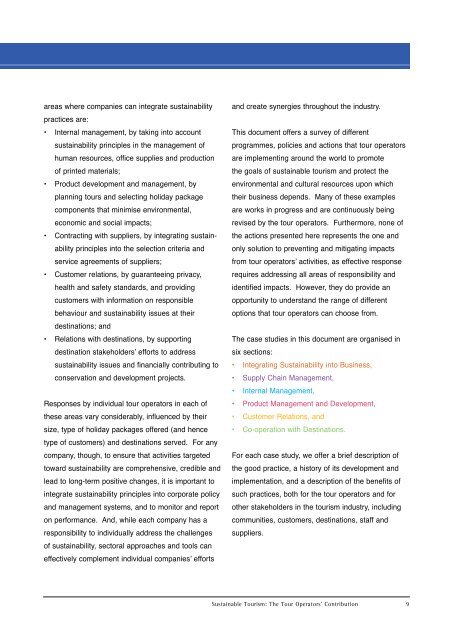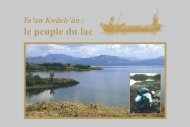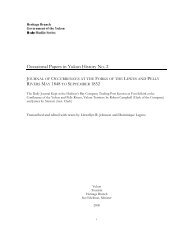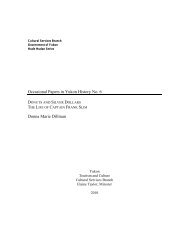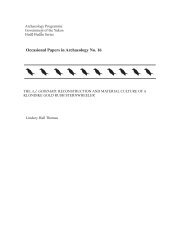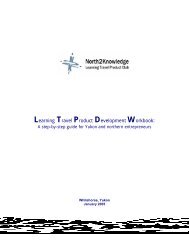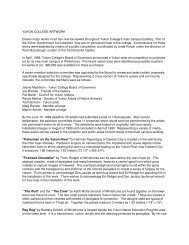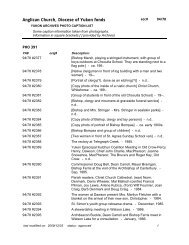Sustainable Tourism: The Tour Operators' Contribution
Sustainable Tourism: The Tour Operators' Contribution
Sustainable Tourism: The Tour Operators' Contribution
Create successful ePaper yourself
Turn your PDF publications into a flip-book with our unique Google optimized e-Paper software.
areas where companies can integrate sustainability<br />
practices are:<br />
• Internal management, by taking into account<br />
sustainability principles in the management of<br />
human resources, office supplies and production<br />
of printed materials;<br />
• Product development and management, by<br />
planning tours and selecting holiday package<br />
components that minimise environmental,<br />
economic and social impacts;<br />
• Contracting with suppliers, by integrating sustainability<br />
principles into the selection criteria and<br />
service agreements of suppliers;<br />
• Customer relations, by guaranteeing privacy,<br />
health and safety standards, and providing<br />
customers with information on responsible<br />
behaviour and sustainability issues at their<br />
destinations; and<br />
• Relations with destinations, by supporting<br />
destination stakeholders’ efforts to address<br />
sustainability issues and financially contributing to<br />
conservation and development projects.<br />
Responses by individual tour operators in each of<br />
these areas vary considerably, influenced by their<br />
size, type of holiday packages offered (and hence<br />
type of customers) and destinations served. For any<br />
company, though, to ensure that activities targeted<br />
toward sustainability are comprehensive, credible and<br />
lead to long-term positive changes, it is important to<br />
integrate sustainability principles into corporate policy<br />
and management systems, and to monitor and report<br />
on performance. And, while each company has a<br />
responsibility to individually address the challenges<br />
of sustainability, sectoral approaches and tools can<br />
effectively complement individual companies’ efforts<br />
and create synergies throughout the industry.<br />
This document offers a survey of different<br />
programmes, policies and actions that tour operators<br />
are implementing around the world to promote<br />
the goals of sustainable tourism and protect the<br />
environmental and cultural resources upon which<br />
their business depends. Many of these examples<br />
are works in progress and are continuously being<br />
revised by the tour operators. Furthermore, none of<br />
the actions presented here represents the one and<br />
only solution to preventing and mitigating impacts<br />
from tour operators’ activities, as effective response<br />
requires addressing all areas of responsibility and<br />
identified impacts. However, they do provide an<br />
opportunity to understand the range of different<br />
options that tour operators can choose from.<br />
<strong>The</strong> case studies in this document are organised in<br />
six sections:<br />
• Integrating Sustainability into Business,<br />
• Supply Chain Management,<br />
• Internal Management,<br />
• Product Management and Development,<br />
• Customer Relations, and<br />
• Co-operation with Destinations.<br />
For each case study, we offer a brief description of<br />
the good practice, a history of its development and<br />
implementation, and a description of the benefits of<br />
such practices, both for the tour operators and for<br />
other stakeholders in the tourism industry, including<br />
communities, customers, destinations, staff and<br />
suppliers.<br />
<strong>Sustainable</strong> <strong><strong>Tour</strong>ism</strong>: <strong>The</strong> <strong>Tour</strong> Operators’ <strong>Contribution</strong>


